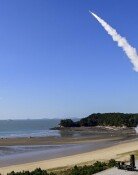[Editorial] The Half Victory of Ukishimamaru
[Editorial] The Half Victory of Ukishimamaru
Posted August. 25, 2001 09:19,
The victory of tragic home-coming ship Ukishimamaru case should be called `half victory` This judgment by Japanese court has made after 56 years since the ukishimamaru(4730t) exploded and sank during the sail to Pusan with thousands of the drafted Korean workers on 1945.8.24, right after Japan’s unconditioned surrender.
Kyoto District court determined that Japanese government should pay 3 million yen for each 15 survivals.(total 45 million yen).
This judgment is significant in that it did not make negative prescription as an issue and made the first juridical judgment on this case. The court said, `` if Japan brought them from Korea, to return them to Korea safely is its legal responsibility.`` This will affect many other cases since it judged that Japan and the boarders of the Ukishimamaru had a similar contract as a passengers and traveling transportation contracts.
But if we take a close look into the case, there are many problems. First, at first glance, the judgment seems to turn over Japan’s official attitude of rejecting reparation for drafted workers, but in fact, it is not. This judgment also has clarified that the reparation has been expired since 1965 Korea-Japan Contract, therefore it does not completely admit that Japan has a responsibility for the drafted workers. Japan does not admit the responsibility for the reparation.
Second, the court said that there is no need for Japanese government to apologize officially. It is very different judgment from the assertion of victims who say that Japan intentionally blasted the ship. Third, the consolation money goes only to the survivals not to the bereaved family of the victims. The court insists that the list is lost, and which is the reason for the rejection. But it is only an excuse.
Fourth, the judgment does not clarify the truth of the explosion and sinking of the ship. Japanese government insists that the cause is the mines by U.S. army, but the survivors insist intentional explosion by Japanese government with various records and witnesses. But the court ignored it and treated this case as a matter of money.
Moreover, we can not guarantee that this judgment by the Kyoto District court will be kept in the upper court. There was an example of failure at the upper court; in 1998, comfort women for Japanese army won in the lower court but lost in the Supreme Court on March. We cannot but deplore Japan’s irresponsible attitude as a perpetrator who harmed many other countries yet refuse to apologize for almost 50 years.







